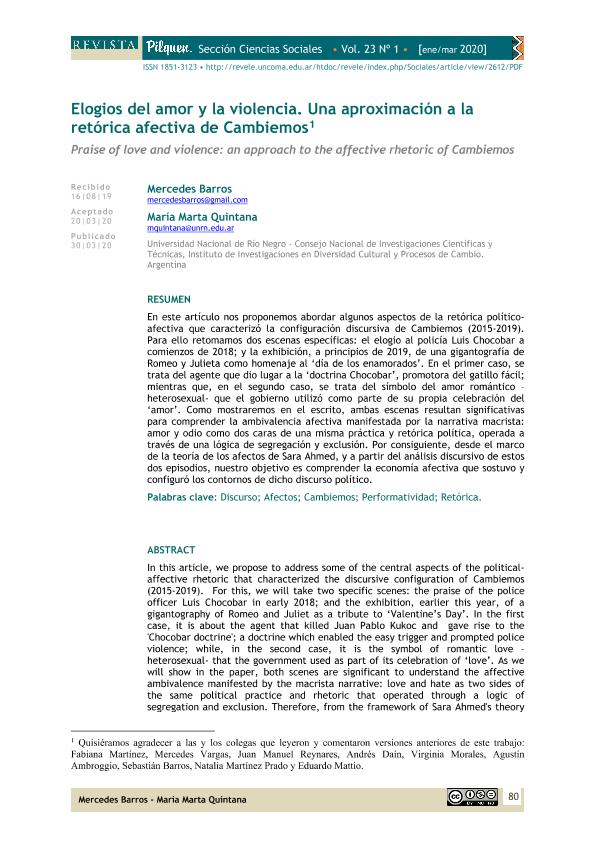Mostrar el registro sencillo del ítem
dc.contributor.author
Barros, Mercedes María

dc.contributor.author
Quintana, María Marta

dc.date.available
2020-07-03T17:18:07Z
dc.date.issued
2020-03
dc.identifier.citation
Barros, Mercedes María; Quintana, María Marta; Elogios del amor y la violencia: Una aproximación a la retórica afectiva de Cambiemos; Universidad Nacional del Comahue. Centro Universitario Regional Zona Atlántica; Pilquen; 23; 1; 3-2020; 80-92
dc.identifier.issn
1851-3123
dc.identifier.uri
http://hdl.handle.net/11336/108765
dc.description.abstract
En este artículo nos proponemos abordar algunos aspectos de la retórica políticoafectiva que caracterizó la configuración discursiva de Cambiemos (2015-2019). Para ello retomamos dos escenas específicas: el elogio al policía Luis Chocobar a comienzos de 2018; y la exhibición, a principios de 2019, de una gigantografía de Romeo y Julieta como homenaje al ‘día de los enamorados’. En el primer caso, se trata del agente que dio lugar a la ‘doctrina Chocobar’, promotora del gatillo fácil; mientras que, en el segundo caso, se trata del símbolo del amor romántico – heterosexual- que el gobierno utilizó como parte de su propia celebración del ‘amor’. Como mostraremos en el escrito, ambas escenas resultan significativas para comprender la ambivalencia afectiva manifestada por la narrativa macrista: amor y odio como dos caras de una misma práctica y retórica política, operada a través de una lógica de segregación y exclusión. Por consiguiente, desde el marco de la teoría de los afectos de Sara Ahmed, y a partir del análisis discursivo de estos dos episodios, nuestro objetivo es comprender la economía afectiva que sostuvo y configuró los contornos de dicho discurso político.
dc.description.abstract
In this article, we propose to address some of the central aspects of the politicalaffective rhetoric that characterized the discursive configuration of Cambiemos (2015-2019). For this, we will take two specific scenes: the praise of the police officer Luis Chocobar in early 2018; and the exhibition, earlier this year, of a gigantography of Romeo and Juliet as a tribute to ‘Valentine’s Day’. In the first case, it is about the agent that killed Juan Pablo Kukoc and gave rise to the 'Chocobar doctrine'; a doctrine which enabled the easy trigger and prompted police violence; while, in the second case, it is the symbol of romantic love – heterosexual- that the government used as part of its celebration of ‘love’. As we will show in the paper, both scenes are significant to understand the affective ambivalence manifested by the macrista narrative: love and hate as two sides of the same political practice and rhetoric that operated through a logic of segregation and exclusion. Therefore, from the framework of Sara Ahmed's theory of affections, and from the discursive analysis of these two episodes, the objective of our paper is to understand the affective economy that sustained and configured the contours of this political discourse.
dc.format
application/pdf
dc.language.iso
spa
dc.publisher
Universidad Nacional del Comahue. Centro Universitario Regional Zona Atlántica
dc.rights
info:eu-repo/semantics/openAccess
dc.rights.uri
https://creativecommons.org/licenses/by-nc-nd/2.5/ar/
dc.subject
DISCURSO
dc.subject
AFECTOS
dc.subject
PERFORMATIVIDAD
dc.subject
CAMBIEMOS
dc.subject.classification
Ciencias Sociales Interdisciplinarias

dc.subject.classification
Otras Ciencias Sociales

dc.subject.classification
CIENCIAS SOCIALES

dc.title
Elogios del amor y la violencia: Una aproximación a la retórica afectiva de Cambiemos
dc.title
Praise of love and violence: An approach to the affective rhetoric of Cambiemos
dc.type
info:eu-repo/semantics/article
dc.type
info:ar-repo/semantics/artículo
dc.type
info:eu-repo/semantics/publishedVersion
dc.date.updated
2020-06-08T15:36:11Z
dc.journal.volume
23
dc.journal.number
1
dc.journal.pagination
80-92
dc.journal.pais
Argentina

dc.journal.ciudad
Viedma
dc.description.fil
Fil: Barros, Mercedes María. Consejo Nacional de Investigaciones Científicas y Técnicas. Centro Científico Tecnológico Conicet - Patagonia Norte. Instituto de Investigaciones en Diversidad Cultural y Procesos de Cambio. Universidad Nacional de Río Negro. Instituto de Investigaciones en Diversidad Cultural y Procesos de Cambio; Argentina
dc.description.fil
Fil: Quintana, María Marta. Consejo Nacional de Investigaciones Científicas y Técnicas. Centro Científico Tecnológico Conicet - Patagonia Norte. Instituto de Investigaciones en Diversidad Cultural y Procesos de Cambio. Universidad Nacional de Río Negro. Instituto de Investigaciones en Diversidad Cultural y Procesos de Cambio; Argentina
dc.journal.title
Pilquen
dc.relation.alternativeid
info:eu-repo/semantics/altIdentifier/url/http://revele.uncoma.edu.ar/htdoc/revele/index.php/Sociales/article/view/2612
Archivos asociados
